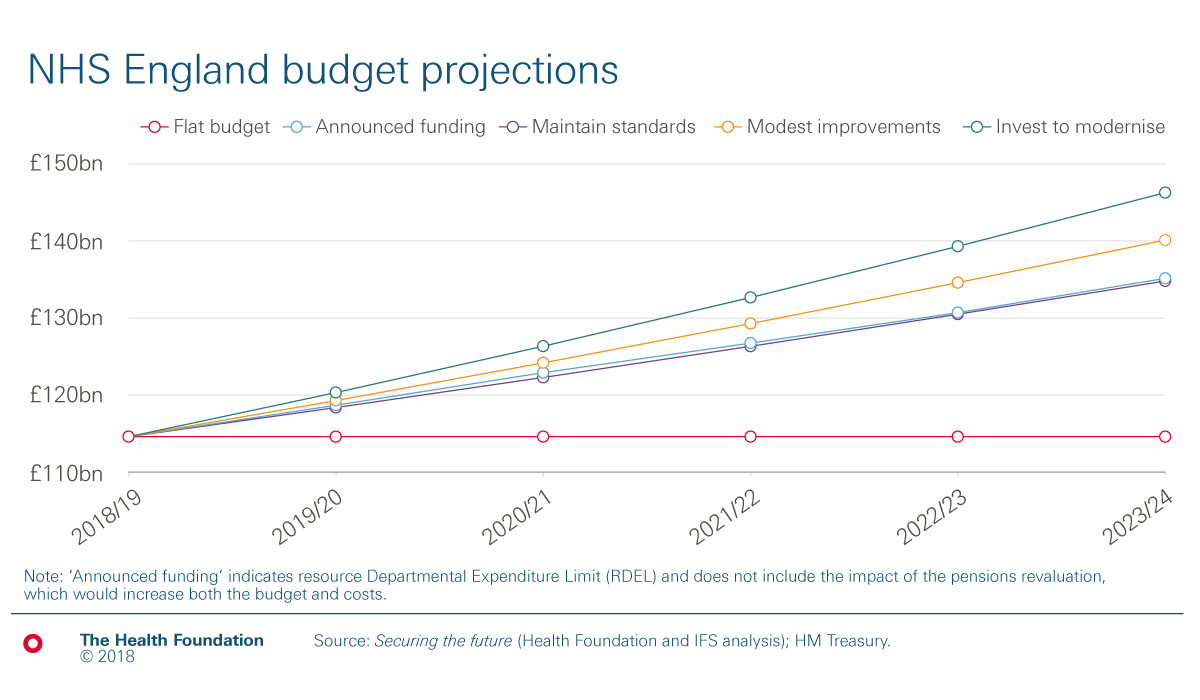Is the recent funding announcement enough for NHS England?
27 June 2018

- The Government has announced an increase to NHS England’s main budget of just over £20bn by 2023/24, an increase of 3.4% a year on average.
- Our analysis from Securing the future suggests that if this is maintained over the next 15 years it should be enough to maintain current standards of care, assuming the rest of the Department of Health and Social Care’s budget grows at the same rate.
- However this is not enough of an increase to allow modest improvements by upgrading areas like mental health provision, public health spending, waiting times, and spending on buildings, equipment, and pay. This would require around 4% a year over the 15 years, which would likely need to be frontloaded as 5% over the first 5 years

The Government announced on the 17th of June that there would be a long-expected funding increase for the NHS.
The announcement is that NHS England’s main budget will be £20.5bn larger in five years’ time than it is now (just less than £400m a week), growing at 3.4 per cent a year on average.
NHS England is the organisation in charge of distributing money to the NHS and so its current budget is £115bn of the Department of Health and Social Care’s total budget of £129bn. (This assumes the additional £800m cost of the new Agenda for Change pay deal is added on top of the DHSC’s current budget, rather than found from elsewhere in it.)
It is worth noting that this money is 'frontloaded' – in the first two years, the budget grows by 3.6 per cent, and then by lower amounts. There is also £1.25bn in cash terms a year extra (on top of this money) as a result of pension revaluation – although this is also a cost for the NHS so it’s not really an increase in funding, and may change depending on what the pension costs end up being.
As set out in our recent report with the IFS, Securing the future, these increases should allow spending to keep up with the pressures that come with a growing, ageing, and increasingly multimorbid population – as well as cost pressures that come from things like medicines getting more expensive and pay growth.
However, our analysis in Securing the future shows that this money is nowhere near enough to modernise the NHS and make serious investment in areas like mental health treatment and spending on buildings and equipment. This would require about 4 per cent a year over the next 15 years, and would likely need frontloaded investment of around 5 per cent a year over the next five years.
Likewise, this analysis was based on increases to the Department’s entire budget – not just NHS England’s budget – which includes much of public health and education and training. If funding in these areas does not rise in line with NHS England’s new settlement then the overall increase is likely to be closer to 3%, which is likely to result in the service being unable to maintain current standards of care.
Further reading
Work with us
We look for talented and passionate individuals as everyone at the Health Foundation has an important role to play.
View current vacanciesThe Q community
Q is an initiative connecting people with improvement expertise across the UK.
Find out more

